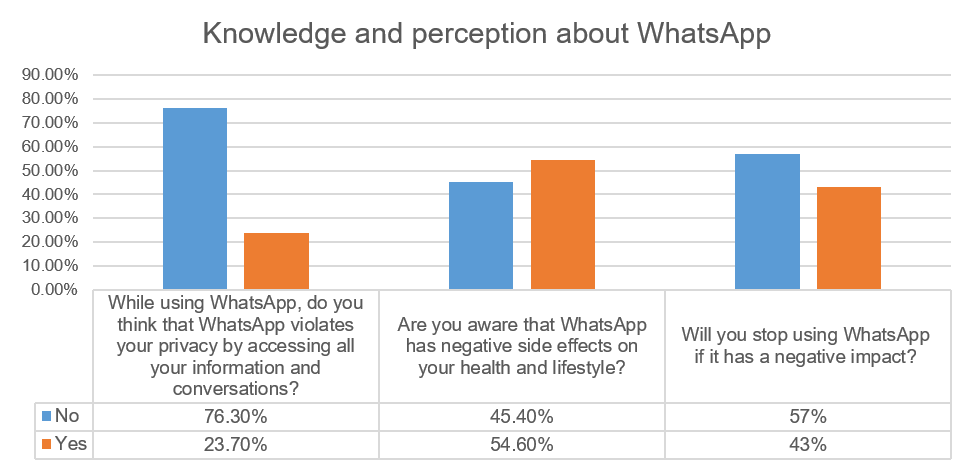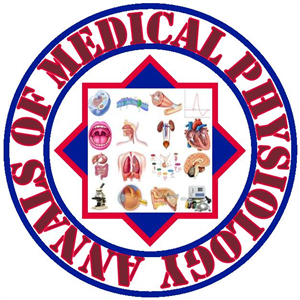Assessing the effects of Instagram and WhatsApp use on behavior of population in south west region of Saudi Arabia
Effect of Instagram and WhatsApp use on behavior
DOI:
https://doi.org/10.23921/amp.2022v6i1.00059Keywords:
Instagram, Overuse, Social Media, WhatsAppAbstract
Social media not only have been proven to cause unhappiness, but it can also lead to development of mental health issues like stress or depression when used too much or without caution. The present study was aimed to assess the knowledge, attitude and behavior of the individuals regarding consequences of Instagram and WhatsApp usage on mental health. The web link of the online questionnaire was disseminated and data was collected for 15 days (16th to 30th January 2022). A total of 632 participants gave consent and took part in this survey. Majority of the participants (76.3%) don't think that WhatsApp use can violate their privacy but 54.6% users have knowledge regarding its negative effects on health and lifestyle. Interestingly, 57% participant refuses to stop using WhatsApp even after knowing the negative effects. Majority of respondents reported that they didn't get influenced about the “stuff” on Instagram. However, 31.80% participants accepted that their feelings get influenced by the number of "likes" they get, and 44.4% participant stated that Instagram have effect on their mood and 19.3% respondents reported that they feel pressure to fit into a certain image on social media. Even, 21.2% participants accepted that they face mental issues because of Instagram use. A small proportion of Instagram users in Jazan reported that it has negative impact on mental health. Majority of the participants are not willing to stop use of WhatsApp even after knowing the adverse effects. It is advisable for social media users to create a social-media free slot in daily routine if they feel sad, lonely or depressed after using social media apps.
Downloads
Metrics
References
Bashir H, Bhat SA. Effects of social media on mental health: A review. Int J Indian Psychol. 2017; 4(3).
Rotondi V, Stanca L, Tomasuolo M. Connecting alone: Smartphone use, quality of social interactions and well-being. J Econ Psychol. 2017 Dec; 63:17-26.
Kaur R, Bashir H. Impact of social media on mental health of adolescents. International Journal of Education. 2015; 5:22-29.
Zhan F, Laines G, Deniz S, Paliskara S, Ochoa I, Guerra I, Tayeb S, Chiu C, Pirouz M, Ploutz E, Zhan J, Gewali L, Oh P. Prediction of online social networks users' behaviors with a game theoretic approach. 2018 15th IEEE Annual Consumer Communications & Networking Conference (CCNC), 2018, pp. 1-2.
Chua TH, Chang L. Follow me and like my beautiful selfies: Singapore teenage girls’ engagement in self-presentation and peer comparison on social media. Computers in Human Behavior. 2016 Feb; 55:190-7.
Jelenchick LA, Eickhoff JC, Moreno MA. "Facebook depression?" social networking site use and depression in older adolescents. J Adolesc Health. 2013 Jan;52(1):128-30.
Hampton KN, Lu W, Shin I. Digital media and stress: the cost of caring 2.0. Information, Communication & Society. 2016; 19(9):1267-86.
Festinger L. A theory of social comparison processes. Human Relations. 1954; 7(2):117-40.
Gilbert P. The relationship of shame, social anxiety and depression: The role of the evaluation of social rank. Clin Psychol Psychother. 2000 Jul; 7(3):174-89.
Stein DJ. Social anxiety disorder and the psychobiology of self-consciousness. Front Hum Neurosci. 2015 Sep 23;9:489.
Vahia VN. Diagnostic and statistical manual of mental disorders 5: A quick glance. Indian J Psychiatry. 2013 Jul;55(3):220-3.
Vogel EA, Rose JP, Roberts LR, Eckles K. (2014). Social comparison, social media, and self-esteem. Psychology of Popular Media Culture. 2014; 3(4):206-22.
Appel H, Gerlach AL, Crusius J. The interplay between Facebook use, social comparison, envy, and depression. Current Opinion in Psychology. 2016 Jun; 9:44-9.
Fatima M, Niazi S, Ghayas S. Relationship between self-esteem and social anxiety: Role of social connectedness as a mediator. Pakistan Journal of Social and Clinical Psychology. 2017; 15(2):12-7.
Cuming S, Rapee RM. Social anxiety and self-protective communication style in close relationships. Behaviour Research and Therapy. 2010 Feb; 48(2):87-96.
Tracy JL, Robins RW. “Death of a (Narcissistic) salesman”: An integrative model of fragile self-esteem: Comment. Psychological Inquiry. 2003; 14(1):57-62.
Johnson BK, Knobloch-Westerwick S. When misery avoids company: Selective social comparisons to photographic online profiles. Human Communication Research. 2016 Jan; 43(1):54-75.
Pantic I, Damjanovic A, Todorovic J, Topalovic D, Bojovic-Jovic D, Ristic S, Pantic S. Association between online social networking and depression in high school students: behavioral physiology viewpoint. Psychiatr Danub. 2012 Mar;24(1):90-3.
Rosen LD, Whaling K, Rab S, Carrier LM, Cheever NA. Is Facebook creating ‘‘iDisorders’’? The link between clinical symptoms of psychiatric disorders and technology use, attitudes and anxiety. Computers in Human Behavior. 2013 May; 29(3):1243-54.
Azizi SM, Soroush A, Khatony A. The relationship between social networking addiction and academic performance in Iranian students of medical sciences: a cross-sectional study. BMC Psychol. 2019 May 3;7(1):28.
Kolhar M, Kazi RNA, Alameen A. Effect of social media use on learning, social interactions, and sleep duration among university students. Saudi J Biol Sci. 2021 Apr;28(4):2216-22.
Owusu-Acheaw M, Larson AG. Use of social media and its impact on academic performance of tertiary institution students: a study of students of Koforidua Polytechnic, Ghana. J Educ Practice. 2015; 6(6):94-101.
Abbas J, Aman J, Nurunnabi M, Bano S. The impact of social media on learning behavior for sustainable education: Evidence of students from selected universities in Pakistan. Sustainability. 2019 Mar 20; 11(6):1683.

Published
How to Cite
License
Copyright (c) 2022 Quench Academy of Medical Education and Research (QAMER)

This work is licensed under a Creative Commons Attribution 4.0 International License.
The authors warrants and represents that the submitted MANUSCRIPT is an original work and has not been published before in any form, and that it does not infringe upon any copyright or other right(s), that it does not contain infringing, libelous, obscene or other unlawful matter, that he/she is the sole and exclusive owner of the rights here-in conveyed to the Publisher, and that he/she has obtained the customary permission from the copyright owner or his legal representative whenever a text/passage from copyrighted material is quoted or a table or illustration from such material is used. The Author(s) will indemnify the Publisher for, and hold the Publisher harmless from any loss, expense or damage occasioned by any claim or suit by a third party for copyright infringement or arising out of any breach of the foregoing warranties as a result of publication of the Article. The Article shall be delivered to the Publisher free of copyright charges. In the event that the Article is not accepted and published by Publisher, this agreement becomes null and void.
Sherpa/Romeo publisher policy can be viewed at Annals of Medical Physiology - Sherpa/Romeo Policy
Plum X metrics
Article level metrics are shown here









